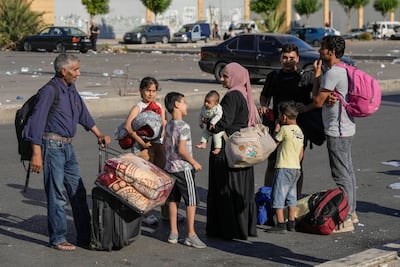Live updates: Follow the latest on Israel-Gaza
Thousands of residents of the southern Beirut suburb of Dahieh were forced to spend the night in the open – in parks and car parks, on the pavements of major thoroughfares, on the seaside corniche, and numerous other urban areas – after renewed Israeli strikes on the capital overnight into Saturday.
The Israeli army called on residents of Dahieh to leave areas “located near Hezbollah interests” after an air raid on a block of residential buildings Friday afternoon, on what the Israeli army said was an underground command and control centre sheltering Hezbollah leader Hassan Nasrallah. The Israeli army claimed later that Nasrallah and other senior Hezbollah leaders had been killed, but Hezbollah has yet to comment.
In Beirut’s Tayouneh neighbourhood, families milled on the sidewalks of the busy roundabout awaiting Israel’s strikes. Some sat on cardboard boxes or blankets, while young men smoked water pipes and scrolled their phones for news. Others set their heads down on the dashboards of their motorbikes and tried to sleep.
Layla, who has two children, walked hurriedly across the square to meet her brother and his family in the park nearby. They planned on spending the night there “because the [government-sponsored] school shelters are not safe. I’m afraid Israel will do like it does in Gaza and start hitting the schools.”
At any rate, nearly every school shelter in Lebanon was at maximum capacity. “It’s going to be a long night,” she told The National. “After this, I don’t know where we’ll go.”
Volunteers walked along the road, distributing water and snacks. Fatima, an older woman in a black hijab, was huddled over her phone as she sat on the roadside kerb.
“I just hope the news of Sayyed Nasrallah being killed is not true. It can’t be,” she said, referring to the Hezbollah leader.
News of renewed Israeli bombardment on Dahieh began to spread. First, the strikes on the three sites that were threatened by the Israeli army. Then news of even more missiles hitting the suburb – more than 20 strikes in three hours.
A disembodied voice in the crowd claimed that the building housing the long-defunct Hawaii College in the neighbourhood of Hamra was preparing to accept displaced people. Fatima’s family and others who heard the unconfirmed news but hoped it was true immediately went in the direction of the college, hoping to avoid a night on the streets.
In Hamra, dozens of families waited at the gates of the college, but the entrance was chained shut. The group, carrying every worldly belonging they could grab in such short notice, milled around. Was the news wrong?
“We mentioned we would come to the site to investigate whether it was a place worth opening as a shelter. But we didn't know whether we'd open it and we didn't tell people to come,” a community organiser told The National.
“The place is dust-infested. There are insects. There’s no electricity. The bathrooms aren’t good. It's not a suitable place to shelter people,” he added.
But it was too late; word was out. With nowhere else to go, the crowd persisted. Eventually, the gates of the university were reopened.
People slowly filed inside. Tomorrow, after a night’s rest, they would worry about the future. Tomorrow, their homes might still be standing. Or they might not.
SPECS
Engine: 4-litre V8 twin-turbo
Power: 630hp
Torque: 850Nm
Transmission: 8-speed Tiptronic automatic
Price: From Dh599,000
On sale: Now
Company%20Profile
%3Cp%3E%3Cstrong%3EName%3A%3C%2Fstrong%3E%20HyveGeo%3Cbr%3E%3Cstrong%3EStarted%3A%3C%2Fstrong%3E%202023%3Cbr%3E%3Cstrong%3EFounders%3A%3C%2Fstrong%3E%20Abdulaziz%20bin%20Redha%2C%20Dr%20Samsurin%20Welch%2C%20Eva%20Morales%20and%20Dr%20Harjit%20Singh%3Cbr%3E%3Cstrong%3EBased%3A%20%3C%2Fstrong%3ECambridge%20and%20Dubai%3Cbr%3E%3Cstrong%3ENumber%20of%20employees%3A%3C%2Fstrong%3E%208%3Cbr%3E%3Cstrong%3EIndustry%3A%20%3C%2Fstrong%3ESustainability%20%26amp%3B%20Environment%3Cbr%3E%3Cstrong%3EFunding%3A%20%3C%2Fstrong%3E%24200%2C000%20plus%20undisclosed%20grant%3Cbr%3E%3Cstrong%3EInvestors%3A%20%3C%2Fstrong%3EVenture%20capital%20and%20government%3C%2Fp%3E%0A
UK%20record%20temperature
%3Cp%3E38.7C%20(101.7F)%20set%20in%20Cambridge%20in%202019%3C%2Fp%3E%0A
WHAT%20MACRO%20FACTORS%20ARE%20IMPACTING%20META%20TECH%20MARKETS%3F
%3Cp%3E%E2%80%A2%20Looming%20global%20slowdown%20and%20recession%20in%20key%20economies%3C%2Fp%3E%0A%3Cp%3E%E2%80%A2%20Russia-Ukraine%20war%3C%2Fp%3E%0A%3Cp%3E%E2%80%A2%20Interest%20rate%20hikes%20and%20the%20rising%20cost%20of%20debt%20servicing%3C%2Fp%3E%0A%3Cp%3E%E2%80%A2%20Oil%20price%20volatility%3C%2Fp%3E%0A%3Cp%3E%E2%80%A2%20Persisting%20inflationary%20pressures%3C%2Fp%3E%0A%3Cp%3E%E2%80%A2%20Exchange%20rate%20fluctuations%3C%2Fp%3E%0A%3Cp%3E%E2%80%A2%20Shortage%20of%20labour%2Fskills%3C%2Fp%3E%0A%3Cp%3E%E2%80%A2%20A%20resurgence%20of%20Covid%3F%3C%2Fp%3E%0A
WOMAN AND CHILD
Director: Saeed Roustaee
Starring: Parinaz Izadyar, Payman Maadi
Rating: 4/5
The bio
Date of Birth: April 25, 1993
Place of Birth: Dubai, UAE
Marital Status: Single
School: Al Sufouh in Jumeirah, Dubai
University: Emirates Airline National Cadet Programme and Hamdan University
Job Title: Pilot, First Officer
Number of hours flying in a Boeing 777: 1,200
Number of flights: Approximately 300
Hobbies: Exercising
Nicest destination: Milan, New Zealand, Seattle for shopping
Least nice destination: Kabul, but someone has to do it. It’s not scary but at least you can tick the box that you’ve been
Favourite place to visit: Dubai, there’s no place like home
'Tell the Machine Goodnight' by Katie Williams
Penguin Randomhouse
Omar Yabroudi's factfile
Born: October 20, 1989, Sharjah
Education: Bachelor of Science and Football, Liverpool John Moores University
2010: Accrington Stanley FC, internship
2010-2012: Crystal Palace, performance analyst with U-18 academy
2012-2015: Barnet FC, first-team performance analyst/head of recruitment
2015-2017: Nottingham Forest, head of recruitment
2018-present: Crystal Palace, player recruitment manager
THE SPECS
Engine: 3.6-litre V6
Transmission: eight-speed automatic
Power: 285bhp
Torque: 353Nm
Price: TBA
On sale: Q2, 2020
Water waste
In the UAE’s arid climate, small shrubs, bushes and flower beds usually require about six litres of water per square metre, daily. That increases to 12 litres per square metre a day for small trees, and 300 litres for palm trees.
Horticulturists suggest the best time for watering is before 8am or after 6pm, when water won't be dried up by the sun.
A global report published by the Water Resources Institute in August, ranked the UAE 10th out of 164 nations where water supplies are most stretched.
The Emirates is the world’s third largest per capita water consumer after the US and Canada.




















